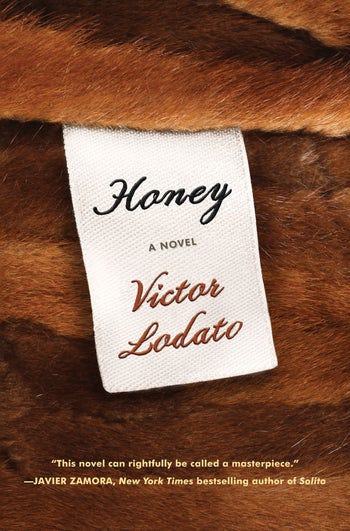HONEY, by Victor Lodato, 400 Pages, Harper Publishing, April 2024
There are those times in the life of a reader when you find a book into which world you are drawn so completely, so deeply and fully, you know you will be talking about it and returning to it again and again, passing it on to friends, it will be one of those touchstones for you, that perfect, magical alchemy of reader and writer’s work that changes you forever, that reason why you read.
My dear, dear aunt, Sissie, taught me to read before I ever went to school, and she bought me all the books I wanted, always. I can so vividly remember those books which were magical in my life. The first ones, the Babar series, and then, reading on my own, Little Women, when I was very, very young. Then, James and the Giant Peach, Charlie and the Chocolate Factory. And, being precocious, I started reading adult novels quite early, ten or eleven, and for reasons not neccessarily literary, I was enraptured by Thomas Tryon’s The Other, and Philip Roth’s Portnoy’s Complaint, though I later came to dislike his writing intensely, with Portnoy, for almost adolescent me, it wasn’t the writing so much as it was the celebration of masturbation which opened a new world — and chafing — to my barely pubescent self.
Gaining a little maturity (never a lot, even now at 63) my aunt introduced me to the magic of the Algonquin Round Table, and thus began my obsession with Dorothy Parker who was a gateway drug to Fran Lebowitz, and together my aunt and I discovered Helene Hanff — I still read 84 Charing Cross Road, Underfoot In Show Business, and Q’s Legacy, almost every year. And in the stacks of magazines accumulating in the unused rooms of the crumbling house where my aunt and grandparents lived, I discovered Joan Didion in The Saturday Evening Post. Reading PLAY IT AS IT LAYS changed my life. Joan Didion was the first writer I loved all on my own, her work didn’t appeal to my aunt, and from there, beginning my own reading journey, I discovered Jane and Paul Bowles, and on and on and on …
All of which is to say, in my personal pantheon of authors, that rarefied world into which entry is almost never granted anymore, I have, having read Honey, sat Victor Lodato at my own personal Algonquin Round, Bloomsbury Set, Violet Quill.
Honey, by Victor Lodato, isn’t just a novel, it’s a world. The life of Honey (originally Ilaria) Fazzinga (or Fasinga, wait and see) is in its last laps when the story begins. Daughter of a crime boss, Honey left the family and its foundation of violence and criminality in her youth, and made a life in the art world. She returns to her roots, a homecoming during which she remembers the past — and we experience it along with her — and she navigates a new world, new and rekindled and better left alone relationships.
Through it all, Honey (the character and the novel) is smart and funny and tough and touching, the heroine one of those characters you will wish you knew in the real world. One you will weep to leave behind.
And, too, there is a beautiful knowing-ness in Mr. Lodato’s prose. Honey deals with betrayals — her own and others, loss, difficult and confusing love, and ways of being and realities which are foreign to her, in and through which she must learn to navigate. Her experience is denotative of the process of aging for those of us who keep growing and evolving as we get older. In today’s world, change happens so quickly, and we have so many mistakes in seeing and being from our history we need to correct, it is often difficult to keep up. And, when one ages, the world sees you through its own prejudices about the aging, the aged, and so Honey deals with people making assumptions about her heart and beliefs because she is of a particular age and “class”, and she, too, diminishes her possibilities by thinking her years come with limits on love and behavior.
It takes a brilliant command of novel-writing and language to deal with the issues of aging, gender, betrayal, death, love, loss, and friendship — oh how gloriously well Mr. Lodato writes of friendship — and, too and most importantly, the process of coming to the end of life with intention, with awareness and agency and grace. And to achieve all of this in a novel that makes you laugh and compels you to read, read, read, so engrossing is the story, and then to cry, and to ache for the characters, and all of it without an ounce of pedantry or maudlin muddle, not to mention having a gorgeous command of time jumps and evocation of period and place.
I loved this book. In case you couldn’t tell. I am awestruck by its beauty, its scope, its insights, and the way it made me smile, feel seen, and held. Please, please read it. You won’t be sorry.
And no, I don’t know Mr. Lodato. Though I did write to him and let him know how much I loved this book. And, despite my pledge not to buy more books after my last move and purge, confession, I read this from the library but have ordered a copy and, too, copies of his previous novels.
Trust me. This is one of those you don’t want to miss.




